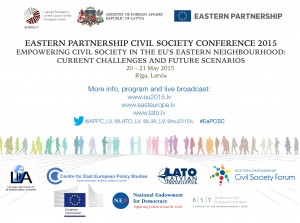 On 20-21 May, the European Union’s Eastern Partnership (EaP) Civil Society Conference will be held in Riga and attended by several hundreds of civil society representatives and experts from EU Member States and EaP countries. High-level politicians and well-known experts from Latvia and other EU Member States as well as EaP countries will hold speeches at the event.
On 20-21 May, the European Union’s Eastern Partnership (EaP) Civil Society Conference will be held in Riga and attended by several hundreds of civil society representatives and experts from EU Member States and EaP countries. High-level politicians and well-known experts from Latvia and other EU Member States as well as EaP countries will hold speeches at the event.
The Conference will be opened by Laimdota Straujuma, the Prime Minister of the Republic of Latvia. Other keynote speakers will include Edgars Rinkēvičs, the Minister of Foreign Affairs of the Republic of Latvia; Johannes Hahn, European Commissioner for European Neighbourhood Policy and Enlargement Negotiations; Tamar Beruchashvili, the Minister of Foreign Affairs of Georgia; Sandra Kalniete, Member of European Parliament; Oleh Rybachuk, Former Vice Prime Minister of Ukraine; Ales Bialiatski, the Chairman of the Belarusian Human Rights Centre “Vyasna” and Vice President of the International Federation for Human Rights of Belarus; Ian Bond, the Director of Foreign Policy at Centre for European Reform; Jeff Lovitt, the Director of the Policy Association for an Open Society, and many others..
The goal of the Conference is to strengthen civil society and involve it in the planning and implementation of the Eastern Partnership policy. Civil Society Conference simultaneously with the Eastern Partnership Summit discusses issues closely related to those discussed at the Eastern Partnership summit. The Conference provides a platform for representatives of civil society, non-governmental organisations and think tanks to debate Eastern Partnership issues.
“The Civil Society Conference, along with the Eastern Partnership Summit, provides possibility to improve the EU Neighbourhood Policy, reducing its bureaucracy and strengthening the flexible and strategic approach. By organizing this Conference, Latvia underlines the great significance of civil society in implementation of the principles of democracy, rule of law and good governance in the Eastern Partnership countries. Achievements of Latvia in the process of creating the civil society are noteworthy, and they will be useful for the six Eastern Partnership countries in their exchange of experience,” said Andis Kudors, Executive Director of the Centre for East European Policy Studies.
The topics to be discussed at the Conference include past achievements and current challenges facing the EU Eastern Partnership policy from a civil society perspective, possibilities for the EaP and the role of civil society in the process of strengthening regional security, possible support mechanisms for strengthening civil society, including cross-border cooperation possibilities, and future topical issues of Eastern Partnership policy. Recommendations on more effective way to achieve the goals of Eastern Partnership will be presented to EU institutions as well as EU and Eastern Partnership member states.
The Eastern Partnership Civil Society Conference in Riga is organised in collaboration between the following hosts:: the Latvian Institute of International Affairs, the Centre for East European Policy Studies and the Latvian Transatlantic Organisation (LATO), with the participation of the Eastern Partnership Civil Society Forum. The conference is supported by the European Commission, the Ministry of Foreign Affairs of the Republic of Latvia, the Secretariat of the Latvian Presidency of the Council of the European Union, the Black Sea Trust, a Project of the German Marshall Fund of the US and the National Endowment for Democracy.
Follow the live streaming of the Conference on the webpages of the Conference hosts, also on this particular web page, as well as on the homepage of the Latvian Presidency of the Council of the European Union: www.eu2015.lv.
The media accreditation for the Conference is closed. The list with the names of the Conference speakers is available at: https://eu2015.lv/events/political-meetings/eastern-partnership-civil-society-conference-2015-05-20
Further information on the event will be available on the webpages of the Conference hosts, the Latvian Presidency of the Council of the European Union and the Ministry of Foreign Affairs of the Republic of Latvia.
Eastern Partnership of the EU
The Eastern Partnership is a part of the European Neighbourhood Policy initiated in 2004 with the objective of avoiding the emergence of strict dividing lines between the EU Member States and their neighbouring countries, thereby strengthening the prosperity, stability and security of the whole region. The European Neighbourhood Policy is based on the values of democracy, the rule of law, and respect for human rights. It is chiefly a body of bilateral relationships between the EU and each partner country, further complemented by regional and multilateral cooperation initiatives and forums.
The decision to establish the Eastern Partnership, with the aim of promoting political association and economic integration with the EU’s eastern neighbours, was taken by the EU Heads of State and Government in May 2009 in Prague. The Eastern Partnership involves Armenia, Azerbaijan, Belarus, Georgia, Moldova, and Ukraine.
Hosts of the Conference
The Latvian Institute of International Affairs (LIIA) was established in May 1992 in Riga as a non-profit foundation charged with the task of providing decision-makers, experts, and the wider public in Latvia with analysis, recommendations and information about international developments, regional security issues, and foreign policy strategy and choices. It is an independent research institute that conducts research, issues publications, and organises lectures, seminars and conferences related to international affairs. The LIIA is Latvia’s oldest think tank and one of its best-known and internationally recognised institutions. It is especially renowned as the leading think tank specialising in international affairs. In its efforts to provide expertise from a Latvian perspective, the Institute and its fellows have participated in and coordinated various international research projects. The Institute has recently been focusing on such research themes as Latvian foreign policy, transatlantic relations, European Union policies, including its Neighbourhood Policy and the Eastern Partnership, multilateral and bilateral relations with Russia and various energy issues.
www.liia.lv
https://www.facebook.com/LIIA.lv
@LIIA_LV
The Centre for East European Policy Studies (CEEPS) is a non-governmental organisation which began its research activities in 2006. Its main goals are: to contribute to the development of Latvian foreign policy by carrying out research into the politics, history and economics of East European countries; to develop cooperation with Latvian and foreign research institutes and other organisations; to identify and explain Latvia’s interests to foreign countries. So far, CEEPS researchers have concentrated on studying issues related to Russia’s soft power, compatriots and media policy. The Centre cooperates with research centres in Estonia, Lithuania, Moldova, Georgia, Ukraine and other countries, and organises various local and international seminars and discussions in which experts take part. CEEPS representatives are regularly invited as experts to present their opinions in the media and to deliver lectures at various conferences, seminars, discussions and other events in Latvia and abroad.
www.appc.lv, www.easteurope.lv
https://www.facebook.com/CentreForEastEuropeanPolicyStudies
@APPC_LV
The Latvian Transatlantic Organisation (LATO) is a non-governmental organisation that brings together like-minded individuals who want to promote Latvia`s membership of NATO. LATO aims to inform Latvian society about NATO and Latvian membership of the Alliance, to promote cooperation with other countries in order to inform the citizens of these countries about Latvia as a NATO member state, and to organise public information events about topical Latvian and Euro-Atlantic security policy issues. In 2011, LATO was granted ‘public benefit organisation’ status in the field of civil society development in appreciation of its goals and performance over its period of operation. This also enables it to strengthen and develop cooperation with corporate partners.
www.lato.lv
https://www.facebook.com/LatvianTransatlanticOrganisation
@LATO_LV
Eastern Partnership Civil Society Forum
The Eastern Partnership Civil Society Forum (EaP CSF) is a unique multi-layered regional civil society platform aimed at promoting European integration, facilitating reforms and democratic transformations in the six Eastern Partnership countries – Azerbaijan, Armenia, Belarus, Georgia, Moldova and Ukraine. Launched in 2009 at the Prague Eastern Partnership Summit, the EaP CSF serves as a civil society and people-to-people dimension of the Eastern Partnership initiative, striving to strengthen civil society in the region, as well as to boost pluralism in public discourse and policy making by promoting participatory democracy and fundamental freedoms.



